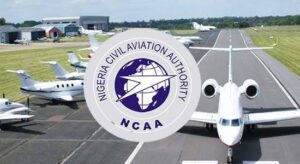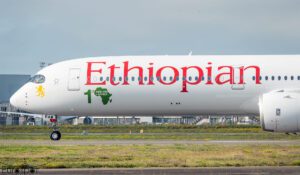
Experts advise FG on Aviation sector’s contribution to GDP
By Tobi Adetunji
The COVID-19 pandemic has led to a whopping 50 per cent crash in the aviation sector’s contribution to the nation’s Gross Domestic Product (GDP).
According to an analysis of the GDP data published by the National Bureau of Statistics (NBS), it was revealed that the contribution of the aviation sector to the economy slumped by 50.09 per cent between 2018 and 2021.
The NBS GDP report is published every quarter and it shows the performance of each sector in terms of their contribution to the economy.
Aviation, Transport, Tourism and Hospitality sectors were among the worst-hit industries as the COVID-19 pandemic led to lockdown of countries as nations shut their borders.
Air travel was almost grinded to a halt as airlines parked hundreds of aircraft and laid off thousands of workers.
According to NBS data, aviation sector’s contribution to the GDP slumped by 50.09 per cent from 0.09 per cent of the GDP in Q2 2018 to 0.05 per cent in Q2 2021.
Its contribution rose by 10.17 per cent to 0.1 per cent of the GDP in Q2 2019 but dropped by 50.08 per cent to 0.05 per cent of the GDP in 2020.
As of Q2 2018, Nigeria’s real GDP was N16.58trillion and the transport sector contributed N216.35billion, representing 1.3 per cent.
According to the NBS, six activities make up the transportation and storage sector: road transport; rail transport and pipelines; water transport; air transport; transport services; and post and courier services.
By Q2 2019, the GDP increased to N16.9trillion with the transport sector’s contribution rising to 1.38 per cent at a value of N233.71billion. This signified a 5.96 per cent year-on-year increase. In Q2 2020, the transport sector’s contribution to the GDP crashed by 46.02 per cent to N118.65billion with the real GDP put at N15.90trillion.
The Q2 2021 numbers showed that the transport sector’s contribution to the GDP rose to N209.79billion, representing 1.26 per cent of the N16.69tn GDP and a 68.37 per cent increase.
Overall, the contribution of the transport sector to the total GDP shrunk by 3.70 per cent between Q2 2018 and Q2 2021. Also, the sector contributed an average of 1.17 per cent between Q2 2018 and Q2 2021.
Of the six activities that make up the transportation and storage sector, the largest contributors on the average over the period were road transportation (N168.01billion), air (N12.22billion), and transport services (N10.90billion).
While the aviation sector’s contribution to GDP slumped by 50.09 per cent from 0.09 per cent of the GDP in Q2 2018 to 0.05 per cent in Q2 2021, the transport services saw a 6.41 per cent decline from 0.07 per cent of the GDP in Q2 2018 to 0.06 per cent of the GDP in Q2 2020.
Meanwhile, Road transportation barely grew by 0.54 per cent to 1.13 per cent of the GDP in Q2 2020 from 1.12 per cent of GDP in Q2 2018.
In 2018, aviation sector’s contribution to the GDP was N15.75billion while the GDP was N16.58trillion. In 2019, the sector’s contribution was N17.69billion while the GDP was N16.90 trillion. In 2020, it was N7.54billion while the GDP was N15.90 trillion. In 2021, it was N7.91billion while the GDP N16.69 trillion.
Meanwhile, industry experts have advised the Federal Government, saying there is a need to develop policies that will enhance the rebound of the domestic and international air travel.
An industry analyst and Publicity Secretary of Aviation Round Table, an industry think-thank and pressure group, Mr. Olumide Ohunayo, linked the drop in aviation sector’s contribution to the GDP to the COVID-19 pandemic. He, however, said there is a need for the Federal Government to come up with policies that will enhance quick recovery.
He said, “The major reason for the sharp drop in 2020 was the COVID-19 pandemic, so most of the airlines were non-functional. When the restrictions were later eased, the number of passengers that came was not up to the optimal number that we had before COVID-19. The airlines also had to restrict the number of passengers they could carry on board.
“The passengers have started returning now and we expect that by mid-2022, the traffic will pick up from where it stopped in 2019. The domestic market is picking up, it’s just the international market that is the problem due to the COVID-19 protocols, cost of tests, and the general inconvenience that have made international travel quite unattractive at the moment.
He added, “For example, looking at the West Coast, Lagos – Accra, it is better not to travel because the test is costlier than your ticket fare and you do about four tests to and fro which is enough to discourage travel. The governments should try and harmonise the testing protocols and take active part in the testing to bring down the cost of tests so you can encourage travel, and once you do that, the aviation industry will pick up.”
Corroborating his view, a former Managing Director, Associated Airlines, Mr. Lex Nwuba, said cost of COVID-19 tests and government policies were slowing down the full rebound of the air travel industry.
Nwuba said, “Passenger confidence has not returned as people are not sure whether it’s safe to fly yet. Also, the cost of flying has increased, not just the ticket costs. For international flights, you also have the cost of tests inbound and outbound-four tests in total. In some places, the costs have risen from N25,000 to as much as N100,000. Naturally these things will drive down demand.
“Clearly, testing can be made free, the government can transmit the information that flying is safe. Also, costs associated with providing services like taxes, airport charges are all increasing, sometimes up to two fold. If they can find a way to reduce these costs, it will help. The real problem is not that people do not want to fly because the associated costs are discouraging.”



